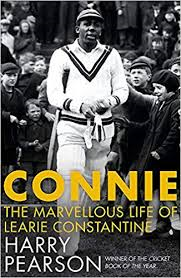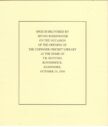Connie – The Marvellous Life of Learie Constantine
Martin Chandler |Published: 2017
Pages: 356
Author: Pearson, Harry
Publisher: Little, Brown
Rating: 4 stars

Any book that wins the Cricket Society/MCC Book of the Year Award must be a good one, and Harry Pearson’s biography of Learie Constantine earned that honour this year. Pearson also won the award in 2011 for a very different type of book, Slipless in Settle, one of those acclaimed titles inspired by the club game which were immensely popular a few years ago. I have to confess they are not my favourite genre of cricket book, but the winning of the prize twice underlines the fact that, unlike many who produce books about cricket, Pearson is a most accomplished writer.
Cricket lovers like to read about the lives of cricketers, although not everyone who has played the game to a high standard has lived an interesting life outside the game. Biographers therefore need to choose their subjects carefully if they are going to produce a good book. Sir Learie Constantine’s life is, I would suggest, very possibly the most interesting the game has seen. To begin with he was a wonderful cricketer, perhaps not one of the truly great players, but as dynamic as any all-rounder there has been.
But there is much, much more to the life of Learie Constantine. He was a highly intelligent man who had legal and political careers as well as his far from conventional time as a professional cricketer. He was also, certainly this side of the Atlantic Ocean, the first iconic black sportsman. In short the combination of a fascinating life and a gifted writer meant that Connie couldn’t really fail and, as the award mentioned confirms, it doesn’t. It is an excellent book and I would not discourage anyone from reading it but, sadly, it is still not the definitive story of Learie Constantine.
Back in the 1930s Constantine published an autobiography, Cricket and I, written for him by his great friend and fellow Trinidadian CLR James. In 1946 he published another such work, Cricket in the Sun, as well as several other books about the game and, in 1954, Colour Bar, his magnum opus on non cricketing subjects. It is perhaps surprising that no one sought to write his story during his lifetime, but for whatever reason the task seems not to have been attempted. Constantine died in 1971, but then four years later a very satisfying biography appeared from Gerald Howat, and at the same time a rather slimmer volume from the Caribbean, A Look at Learie Constantine, from Undine Guiseppe. More recently, in 2008, Peter Mason published a further biography much enjoyed by Archie Mac.
When I first heard about Connie I was curious as to what material Pearson might have had access to that his predecessors did not. The answer, sadly, would appear to be not very much, which is not intended to be a criticism, merely another way of observing that there is more to know. There is however great strength in Pearson’s book, particularly in the way it deals with Constantine’s years at Nelson in the Lancashire League, and putting that in the wider context of 1930s Britain. That Pearson is a northerner himself, and one who well understands what makes club cricket tick explains that one. It really is a case of no praise being too high for the way Connie deals with that aspect of Constantine’s life.
In fact with one exception the whole of Constantine’s life in cricket is dealt with in exemplary fashion, that doubt being the 1929/30 MCC visit to the Caribbean. It is not a tour that many have written about at any length and six months ago its treatment in Connie would not have struck me as in any way lacking. That, however, was before I read Ross English’s Cricket and England Through Five Matches, a book which demonstrates that in truth there were a few more ‘undercurrents’ flowing on that trip than is generally acknowledged.
Where I remain convinced more work needs to be done in relation to Constantine is on the many subjects that make up his life after cricket. Thirty pages is simply insufficient to do justice to a man who achieved so much of significance in so many different fields. I hope one day such a book might appear, but in the meantime Connie is the best we have, and is certainly recommended.






Leave a comment